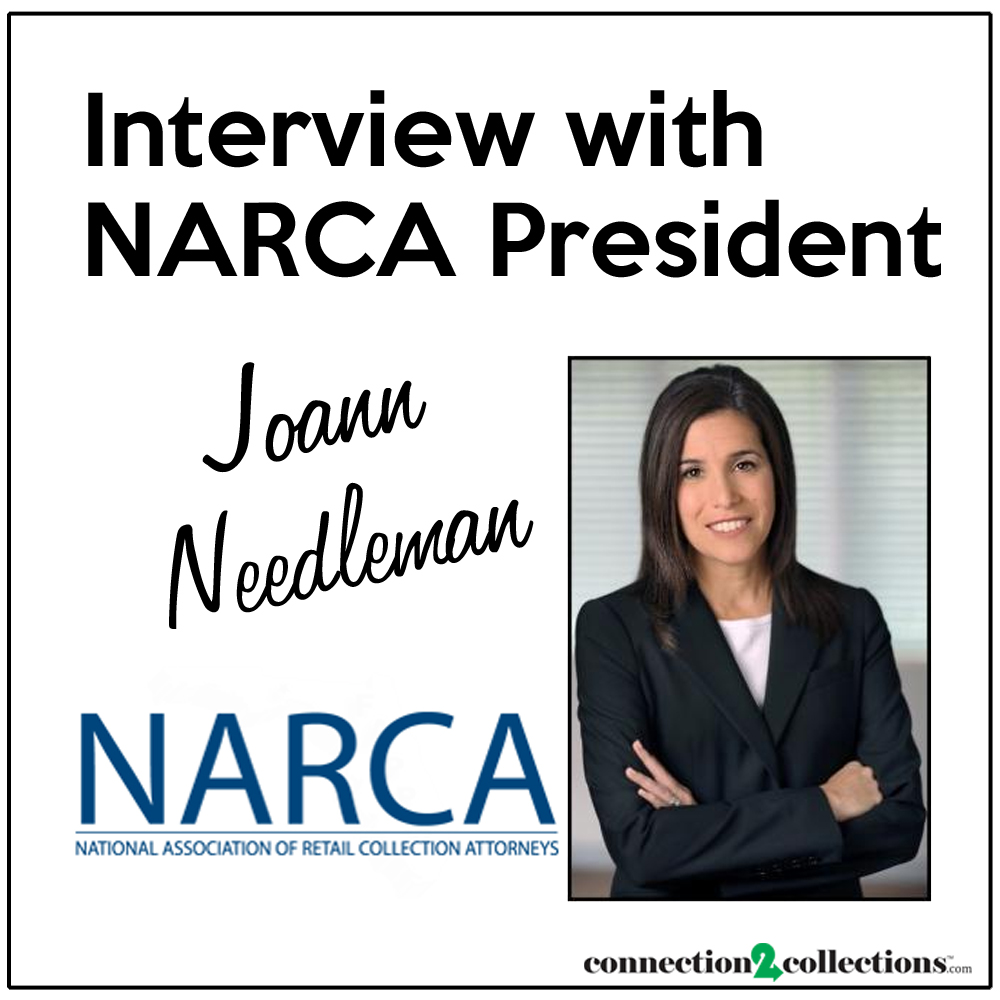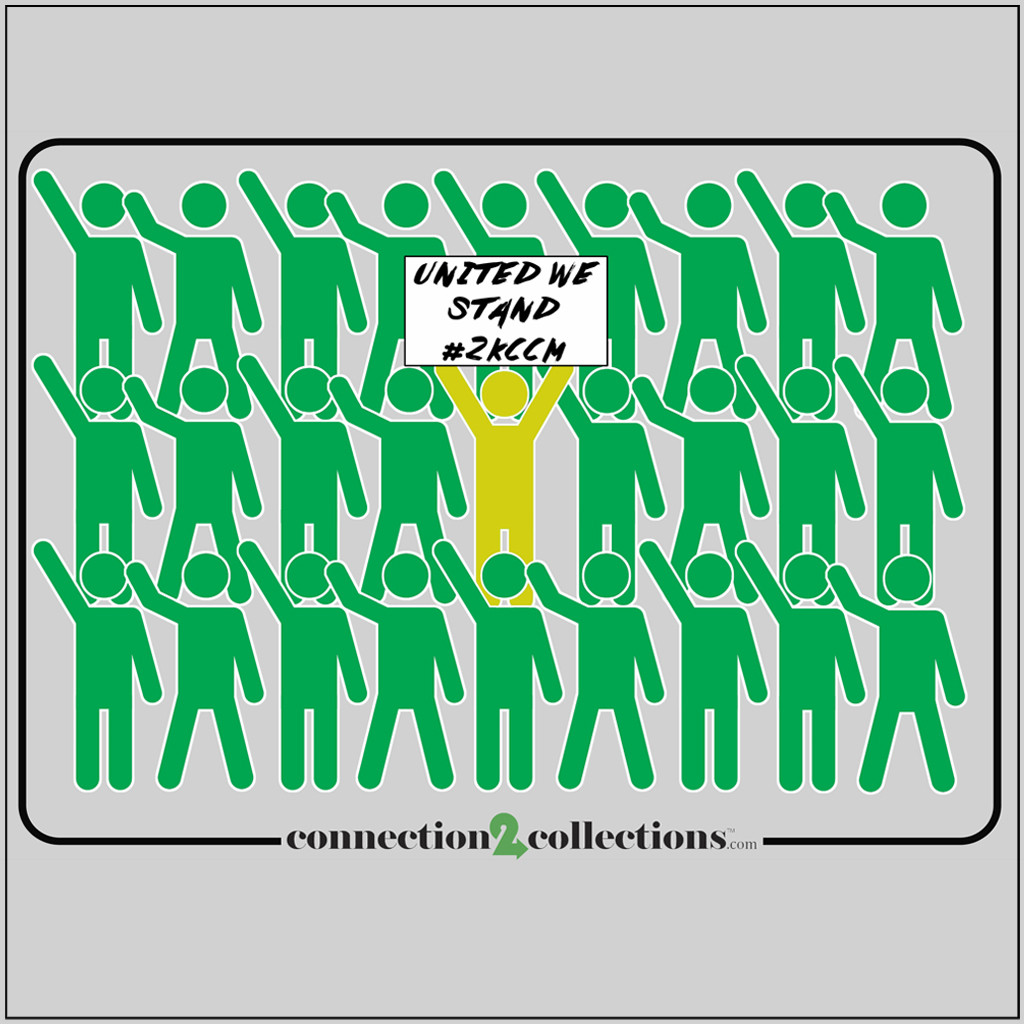
A Sit Down With NARCA President, Joann Needleman
The debt collection industry, as almost everyone knows, doesn’t get the best coverage in the media. Here at Connection2Collections.com, we want to show support for the industry professionals and help them be confident and responsible in their work. Our unique approach to the industry helps us keep our content light, and makes it fun for everyone in collections. But truth be told, we’re no joke and we want to bring you information that matters, and from the people who matter most in the industry.
We were lucky enough to sit down with the current President of NARCA (National Association of Retail Collection Attorneys), Joann Needleman just after her recent appointment to the CFPB’s Advisory Board. Some collectors and even agency people may not know who she is. But let us make this clear, she is on the front lines fighting for EVERYONE in the industry making sure that we are getting fair treatment from; judges, debtor attorneys, consumer groups, and even the government’s newest regulatory body; the CFPB (Consumer Financial Protection Bureau).
Now, she’s not just “fighting” for us, she’s collaborating, negotiating, and brainstorming to help make the debt collection industry a better place for professionals. And that’s not all, she’s also working with the board and members of NARCA to help educate and train business owners and attorneys to act responsibly and protect consumers and our industry as a whole. It’s truly an honor and a privilege for us to have a chance to talk with her. And we’re even more excited to share some of our interview with you.
Enjoy!
A Sit Down With NARCA President, Joann Needleman
. . .
C2C:
Thank you for taking the time to talk to us, as you know, we’re a new company diving into the debt collection industry during what appears to be a very exciting yet frightening time. Our goal is to help unite the professionals in the industry and get information to the people on the phones and in the offices who may not be exposed to the activity that’s happening in the big conference rooms in Washington DC. Can you share a bit about yourself and your experience in the industry so our readers can get a good idea of who NARCA President Joann Needleman is?
President Needleman:
Thank you. I have been an attorney for twenty (20) years practicing in the areas of consumer financial services, creditors’ rights and debt collection. I have successfully defended creditors against claims brought under the Fair Debt Collection Practices Act, Fair Credit Reporting Act and, in Pennsylvania, under the Fair Credit Extension Uniformity Act. In addition, I consult regularly with financial institutions, law firms and debt buyers throughout the country regarding regulatory and compliance issues and procedures. I am also the current President of NARCA, a legal trade association comprised of attorneys who practice in debt collection litigation.
In my role as President, I meet regularly with the CFPB and have been invited to participate in their many symposiums, roundtables and field hearings on the topic of legal debt collection. I think it is because of this collaboration that I was chosen to sit on the Consumer Advisory Board (CAB) of the CFPB. I am honored to have been chosen and thrilled that NARCA is the only industry representative on the CAB.
C2C:
In the collection industry, there are thousands of individuals who don’t have access, or the means, to participate in educational conferences hosted by the leading organizations. These organizations are working to not only educate their members, but are also the leaders in a campaign to work with the legislators to find reasonable oversight and better laws to regulate our conduct. As the President of NARCA, what do you believe are some of the most important challenges facing NARCA as an organization as well as its members; business owners, vendors, collectors, etc.?

President Needleman:
Last year I wrote a blog article titled “WHY “TOO BIG TOO FAIL” HAS RESULTED IN “TOO SMALL TO SUCCEED”:
..Whether your business or law firm was a large or small participant in the debt collection space, as a provider of any “material service” to a larger participant you are deemed a “service provider” and subject to examination and enforcement by the CFPB. This guilt by association has made every small business and law firm an agent rather than an independent contractor. Simple Economics 101 tells us that larger participants, in an effort to minimize these risks and exposure, will now look only to those larger partners who can support such expansive and extensive compliance, leaving the small business out in the cold.
64% of NARCA member firms have 25 or less employees. With placements decreasing and compliance requirements increasing exponentially, smaller firms are either exiting the industry or merging with other firms. NARCA is a firm-based membership so in all likelihood our future membership roles will decline. NARCA’s mission to “preserve and enhance the viability of legal collections” and our job as leaders in the legal collections industry is to identify those challenges and implement strategies to overcome them. NARCA is doing that.
Our Board of Directors met a few weeks ago to start that discussion. Our theme was “Building a New House”. We engaged the membership in an extensive survey to uncover not only the key threats but to learn of the “wants and needs” necessary to sustain our members well into the future. It will require an entirely new thinking about the way we do business and the partnerships we make with our clients and vendors.
C2C:
Business owners in the industry are afraid of the future of the industry. Firms are scaling back their operations, merging with others, and even shifting their business model to service other industries. It could be said that the debt collection industry is a necessity in a credit based economy, but what do you think needs to happen to make this profession a worthwhile endeavor for an individual currently in the field or looking to get in?
 President Needleman:
President Needleman:
I believe there is incredible opportunity for young lawyers coming into this industry. As the CFPB, as well as the states, begin to write rules and dictate litigation standards, the need for more attorney involvement will be necessary in any firm. Debt collection litigation provides young lawyers with a great deal of on-the job training. Many young lawyers are in court everyday managing a case load and working one-on-one with consumers.
I also believe that once rules are written, litigation will increase as the ability to contact concerns by non-litigation means will be ineffective. The industry needs to build better bridges with law schools. Consumer advocates have a well of students willing to participate in law clinics. We should be doing the same for our industry. It is important to stress that we are part of the solution to a consumer’s good credit and not the problem.
C2C:
Due to the negative stigma attributed to being a professional debt collector, locating and linking the individual professionals on the front lines is an arduous and nearly impossible task. Our website hopes to start a movement. The idea behind this movement is; “2 Keep Calm and Collect Money”. The goal is to unite these individuals by showing them the appreciation and support for the job they do. We aim to educate these individuals so that they can face their daily job challenges head on.
There do not seem to be local organizations or groups who are linking debt collection professionals in different regions. And we aim to create grass roots movements to get individuals involved and motivated to not only act responsibly in their profession, but to get the word out and send a message that we do not need to hide but we can be proud of our profession and we must always act with integrity and empathy.
We hope to take a bottom up approach, and want to show our support to these professionals on the front lines. What efforts, if any, are you aware of that are currently in place to help educate the individuals on the front lines? Do you feel that uniting these individuals could assist in the development of a stronger workforce? What do you believe can be done to help create a more responsible workforce in our industry?
President Needleman:
My best advice for any debt collection professional is to get involved at the association level both nationally and locally. At NARCA we hold two (2) conferences a year. This is a chance to engage and network with colleagues to not only share war stories but to develop best practices. On the state and local level, find a State Creditors’ Bar Association (SCBA) or start one yourself. There are over 34 SCBAs across the country who meet regularly either in person or by conference call. These SCBAs share best practices, exchange ideas, support advocacy efforts including updates on legislative and rule changes.
Finally, a top priority for any debt collection professional is to get involved in financial literacy efforts. NARCA’s program called “Avoiding the Debt Trap” which is a 30-40 minute CD which can be played on its own or by a power point is also available to individuals. Go to schools, colleges, churches, etc. and talk to people about the ramifications of bad credit. It is amazing how willing people are to discussing this issue.
C2C:
The state of the industry appears grim. Individuals are afraid of losing their jobs, having to change careers, owners losing thousands in damages due to plaintiff friendly legislation, and even losing their businesses as a whole. As the President of NARCA, and also as a professional in the industry yourself, what insight/advice/outlook could you offer to the professionals in the industry as to where we are headed, what to expect, and is there any “light at the end of the tunnel”?

President Needleman:
Despite the calamity, I do see positive changes on the horizon. This is a critical time for the industry, but with any challenges comes opportunity. Those that self-reflect and re-invent will survive. Debt collection rules will help because it will provide clarity where there has been none. From the attorney perspective, as stated above, I do believe litigation will increase as there will be fewer options for recovery in the non-legal space. I also believe that the days of lack of documentation will be over, so with more documentation and defined court rules, proving up any collection cases and resolving cases before litigation will also increase.
. . .
So there you have it, wise words from President Joann Needleman. The industry is in a state of flux and her advice should be listened to. No matter who you are in the industry, a file clerk or an experienced attorney, the way things are these days everyone is feeling it. Get involved, seek out information, and also find ways to get information out to the rest of the world. There are brilliant lawyers and business professionals who are making great strides in helping our industry get through this tough time, but it’s everyone’s responsibility to get involved.
Always remember that a chain is only as strong as its weakest link, and we must all band together to be professional and responsible debt collection professionals. With so many groups fighting against us, the more we work together and educate ourselves and one another, the more hope there is for a bright future in the industry. Just like President Needleman said; “Those that self-reflect and re-invent will survive.” Stay alert to the change, prepare yourself and your staff. Don’t be afraid to ask questions.
If you don’t know, don’t do it. The media and the consumer attorneys are just waiting for one mistake, the more prepared we are and the more educated we become, the more respect we will earn from the general public. No matter what the media says, we ARE professionals and we ARE responsible and show empathy for the consumers we contact.
Opportunities are endless, but we must work together.
If you’re interested in learning more about NARCA or becoming a member, visit their page here to learn all about it!
1 Comment
Leave a Reply
You must be logged in to post a comment.


起きる 起こす 英語 - August 26, 2024, 6:32 pm
Or are you? The internet is full of questionable tax advice for people working in one state and living in another, including a few dubious suggestions that you’re pretty sure could land you in hot water.